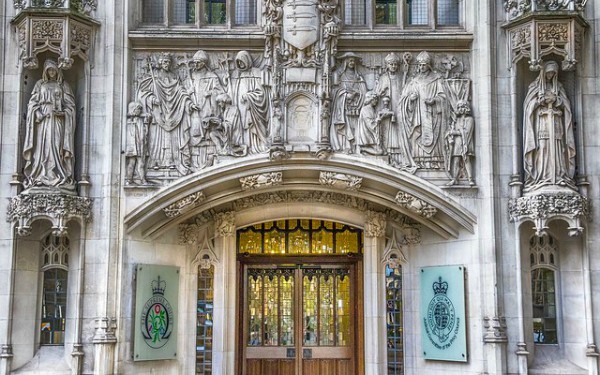
The Supreme Court has voiced its ‘deep anxiety’ over the ongoing shortage of secure accommodation for children and highlighted the government’s failure to address it in the face of repeated warnings by judges.
The comments came in a judgment in which the court said it was lawful, but an “imperfect stop gap”, for the High Court to use its inherent jurisdiction to authorise children’s deprivation of liberty outside of approved secure accommodation.
In Re T, it rejected an appeal from a young person about High Court orders authorising her placement in an unregistered and then a non-secure children’s home.
However, giving the lead judgment in the case, Lady Black warned that the Supreme Court’s conclusion “[did] not address or resolve the underlying cause” of the dearth of accommodation for children with complex needs who were a risk to themselves or others.
Lack of government action on judges’ warnings
She stressed that the “shortcomings” of the care system which gave her “deep anxiety” were “by no means new”. She cited the growing number of applications for the High Court to use its powers in recent years and the many calls by family court judges and the former Children’s Commissioner for England for increased provision for children with complex mental health and other needs, including suicidal, self-harming or sexually harmful behaviour and a history of arson.
However, she highlighted that such calls had not been met by government, adding: “It has been drawn repeatedly to the attention of those who could be expected to take steps to ameliorate the situation, without noticeable effect.”
Lady Black also said that the Supreme Court’s judgment would “no doubt add materially” to the number of cases of this kind going to the High Court.
Related articles
Although T’s appeal was now “academic” as she was 19 and living independently”, Lady Black said the issues in her case continued to affect a significant number of children whose circumstances were put before the High Court. They were those who met the criteria for a secure accommodation order but for whom no secure home place could be found or whoselocal authority assessed that their needs would be better met in an alternative placement – for example, with specialist therapeutic care. Lady Black also identified another group of children who did not meet the secure accommodation criteria but needed to be deprived of their liberty to keep them safe.
T had been in the care of Caerphilly council and, prior to the period covered by her appeal, had been placed in approved secure accommodation. The case she took to the Supreme Court, which had been dismissed by the Court of Appeal in 2018, related to a period in 2017 when Caerphilly had to seek alternative accommodation to meet all her needs. She was moved, firstly, to an unregistered children’s home and, when this broke down, to a registered children’s home that was not approved for secure accommodation. In both homes, she was deprived of her liberty and these arrangements were authorised by the High Court.
Appeal grounds rejected
The Supreme Court rejected T’s argument that section 100(2)(d) of the Children Act 1989 – which prohibits the use of the inherent jurisdiction to empower a local authority to determine any question in relation to parental responsibility for a child – meant it should not be used in her case. It said that, as T was already subject to a care order, the local authority already had parental responsibility for her so the question did not arise.
T’s second ground of appeal was that using the inherent jurisdiction for this purpose cut across the statutory scheme in relation to secure accommodation under section 25 of the Children Act 1989/section 119 of the Social Services and Well-being (Wales) Act 2014.
The Supreme Court dismissed this argument and agreed with the interpretation put forward by the education secretary that if a local authority cannot apply for a section 25/section 119 order because there is no approved secure accommodation available, “the inherent jurisdiction can, and will have to be, used to fill that gap”.
“It is fortunate that the inherent jurisdiction is there to fill the gaps in the present provision, but it cannot be doubted that it is only an imperfect stop gap, and not a long term solution,” Lady Black continued. She drew attention to the “grave reservations” judges had expressed in similar cases about unregulated or unregistered placements not being fully equipped to meet a child’s welfare needs but the “only option” to keep them safe.
Decision issued ‘through gritted teeth’
In her concurring judgment, Lady Arden said it was not satisfactory for the courts to be used to address “not just a specific gap but a systemic gap” in the care system.
Mental capacity law barrister Alex Ruck Keene described the Supreme Court’s decision as one made “through gritted teeth”. In his blog, he noted that the judges would not have seen the High Court’s recent decision in Wigan BC v Y, where it refused to use the inherent jurisdiction to authorise the ongoing deprivation of liberty of a 12-year-old boy in a general hospital paediatric ward not set up to manage his “challenging, violent and increasingly self-harming behaviour”. The High Court had found that “the absence of an alternative cannot render what is the single option available in Y’s best interests and hence lawful.”
It was “difficult to see” that the Supreme Court would not have endorsed this conclusion, Ruck Keene said.
Lady Black said she had been particularly concerned about whether it was lawful for the inherent jurisdiction to be used to authorise a placement in an unregistered children’s home given that a person who manages such a home is committing a criminal offence. She agreed with Lord Stephens, who rejected the arguments by the education secretary that there would be a defence of “necessity/duress of circumstances” if criminal charges were made.
Criminal offence concerns
The judges emphasised that the High Court’s focus was on the welfare and safety of children. “Obviously, that central focus requires the court to give anxious and detailed consideration to the risks to the child in respect of a placement in which [a criminal] offence may be committed. However, the High Court is not required to determine whether an offence will be committed or whether the individual has an available defence,” Lord Stephens found, and said prosecution would be a matter for the criminal courts.
The Supreme Court drew attention to guidance by the President of the Family Division issued in November 2019 that says, where such placements have been authorised, registration should be sought “expeditiously” with duties on the court to monitor the progress of the application, keep its approval of the placement under review if registration is not achieved and check that the local authority is “taking steps to assure themselves” that the child’s care is safe and suitable. An addendum issued in December 2020 also requires local authorities to immediately notify Ofsted or the Care Inspectorate Wales when unregistered placements are made.
T’s other ground for appeal – that as she consented to the placements, court authorisation was not necessary and against her best interests – was also dismissed. Lady Black said she accepted it was “of particular significance to [T] that her views should be respected” but agreed with the Court of Appeal that T’s behaviour demonstrated that her consent was not “authentic and enduring”.
The judge noted that “even leaving to one side difficult issues about the pressures that circumstances may place on a child to consent to a proposed arrangement, an apparently balanced and free decision made by a child may be quickly revised and/or reversed”. She said the case clearly demonstrated the “insecurity” of a child’s apparent consent.
However, she emphasised that this case was not the place to comprehensively explore “the complications attending consent to deprivation of liberty” and the Supreme Court was not setting up “new tests” for consent in this type of case.
Upcoming ban on unregulated placements
The judges also noted that the T was 15 at the time of her placements in 2017 and a ban on placing under-16s in unregulated homes is due to come into force in September. Lady Arden said her conclusions were on the basis that the education secretary was only asking the High Court to exercise its inherent jurisdiction going forward to authorise the placement of a child over 16 in an unregistered home. “Any other application will have to be considered on its merits,” she continued.
In response to the judgment, a DfE spokesperson said: “Every young person in care deserves to live in accommodation that meets their needs and keeps them safe and local authorities are responsible for providing sufficient and suitable accommodation for the children they look after.
“We are developing a new capital funding programme to aid local authorities to establish new children’s homes. We will also provide a further £24m this year to start a new programme focused on maintaining and increasing the number of secure children’s home places available, so more children are in high-quality, safe homes close to their families and support networks.”




 Bournemouth, Christchurch and Poole
Bournemouth, Christchurch and Poole  Hampshire County Council
Hampshire County Council  Lincolnshire County Council
Lincolnshire County Council  Norfolk County Council
Norfolk County Council  Northamptonshire Children’s Trust
Northamptonshire Children’s Trust  South Gloucestershire Council
South Gloucestershire Council  Wiltshire Council
Wiltshire Council  Wokingham Borough Council
Wokingham Borough Council  Children and young people with SEND are ‘valued and prioritised’ in Wiltshire, find inspectors
Children and young people with SEND are ‘valued and prioritised’ in Wiltshire, find inspectors  How specialist refugee teams benefit young people and social workers
How specialist refugee teams benefit young people and social workers  Podcast: returning to social work after becoming a first-time parent
Podcast: returning to social work after becoming a first-time parent  Podcast: would you work for an inadequate-rated service?
Podcast: would you work for an inadequate-rated service?  Family help: one local authority’s experience of the model
Family help: one local authority’s experience of the model  Workforce Insights – showcasing a selection of the sector’s top recruiters
Workforce Insights – showcasing a selection of the sector’s top recruiters 

 Facebook
Facebook X
X LinkedIn
LinkedIn Instagram
Instagram
Comments are closed.